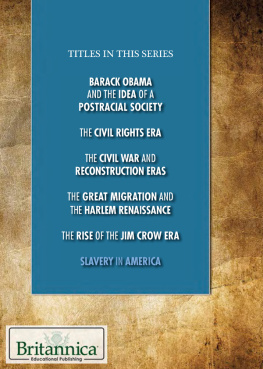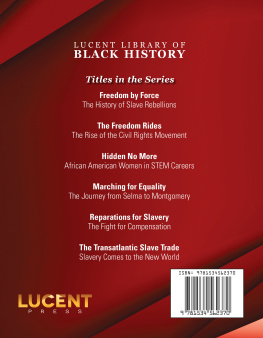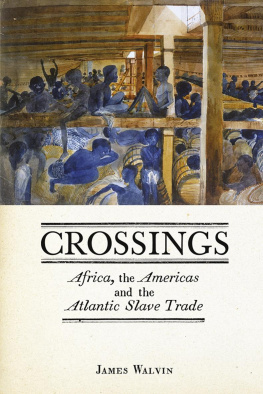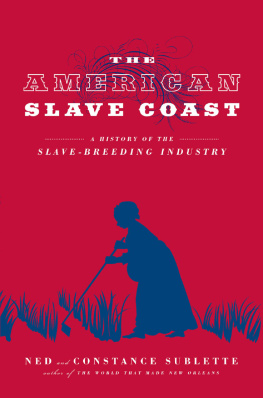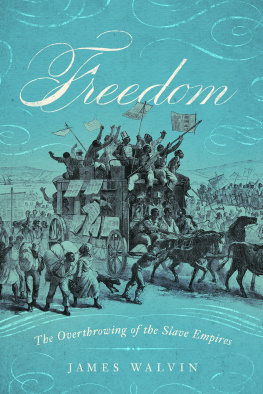
Published in 2016 by Britannica Educational Publishing (a trademark of Encyclopdia Britannica, Inc.) in association with The Rosen Publishing Group, Inc.
29 East 21st Street, New York, NY 10010
Copyright 2016 by Encyclopdia Britannica, Inc. Britannica, Encyclopdia Britannica, and the Thistle logo are registered trademarks of Encyclopdia Britannica, Inc. All rights reserved.
Rosen Publishing materials copyright 2016 The Rosen Publishing Group, Inc. All rights reserved.
Distributed exclusively by Rosen Publishing.
To see additional Britannica Educational Publishing titles, go to rosenpublishing.com.
First Edition
Britannica Educational Publishing
J. E. Luebering: Director, Core Reference Group
Anthony L. Green: Editor, Comptons by Britannica
Rosen Publishing
Hope Louri Killcoyne: Executive Editor
Ciara Campbell: Editor
Nelson S: Art Director
Nicole Russo: Designer
Cindy Reiman: Photography Manager
Karen Huang: Photo Researcher
Library of Congress Cataloging-in-Publication Data
Slavery in America/edited by Ciara Campbell.First edition.
pages cm.(The African American experience: from slavery to the presidency)
Includes bibliographical references and index.
ISBN 978-1-6804-8038-2 (eBook)
1. SlaveryUnited StatesHistoryJuvenile literature. 2. Slave insurrectionsUnited States. 3. Antislavery movementsUnited StatesHistory19th centuryJuvenile literature. 4. African AmericansHistoryTo 1863Juvenile literature. I. Campbell, Ciara.
E441.S6323 2015
306.3620973dc23
2014039198
Photo credits: Cover (Frederick Douglass) Everett Historical/Shutterstock.com; cover (background), pp. 5051, 61 Hulton Archive/Getty Images; pp. 5 DEA/M.Seemuller/De Agostini/Getty Images; pp. 9, 1011 De Agostini/Getty Images; pp. 13 Private Collection/ Michael Graham-Stewart/Bridgeman Images; pp. 1415 Time Life Pictures/Mansell/The Life Picture Collection/Getty Images; pp. 1819 Private Collection/The Stapleton Collection/Bridgeman Images; p. 21 Three Lions/Hulton Archive/ Getty Images; pp. 2223 Private Collection/ Look and Learn/Bridgeman Images; pp. 2425 Library of Congress Prints and Photographs Division; pp. 2627, 32, 4445, 57, 63 MPI/Archive Photos/Getty Images; p. 33 Jupiterimages/Stockbyte/Getty Images; p. 34 Library of Congress Rare Book and Special Collections Division; pp. 3637 Private Collection/Peter Newark American Pictures/Bridgeman Images; p. 39 Andy Murphy/Alamy; p. 40 Stock Montage/Archive Photos/Getty Images; p. 42 Fotosearch/Archive Photos/Getty Images; p. 48 J.R. Eyerman/The Life Picture Collection/Getty Images; pp. 5253 Newberry Library, Chicago, Illinois, USA/Bridgeman Images; p. 54 Universal Images Group/Getty Images; interior pages background texture iStockphoto.com/ Piotr Krzelak.
CONTENTS
O laudah Equiano, a self-proclaimed West African who was sold into slavery and later freed, wrote the first slave narrative to become an international best seller. In his two-volume autobiography, The Interesting Narrative of the Life of Olaudah Equiano; or, Gustavus Vassa, the African, Written by Himself (1789), he traces his life from boyhood in West Africa, through the dreadful transatlantic Middle Passage and years of slavery in the New World, to eventual freedom and economic success as a British citizen:
The first object which saluted my eyes when I arrived on the coast was the sea, and a slave ship, which was then riding at anchor, and waiting for its cargo. These filled me with astonishment, which was soon converted into terror when I was carried on board. I was immediately handled and tossed up to see if I were sound by some of the crew; and I was now persuaded that I had gotten into a world of bad spirits, and that they were going to kill me.When I looked around the ship too and saw a large furnace or copper boiling, and a multitude of black people of every description chained together, every one of their countenances expressing dejection and sorrow, I no longer doubted of my fate; and, quite overpowered with horror and anguish, I fell motionless on the deck and fainted. When I recovered a little I found some black people about me.I asked them if we were not to be eaten by those white men with horrible looks, red faces, and loose hair.

Top: African slave traders kidnap fellow Africans from a village. Bottom: An 18th-century print illustrates how Africans were inhumanely crammed into slave ships during the slave trade.
Documents discovered at the turn of the 21st century, which suggest that Olaudah Equiano may have been born in North America, have raised questions, still unresolved, about whether his accounts of Africa and the Middle Passage are based on memory, reading, or a combination of the two.
Nevertheless, this account of the life of a former slave and others like it comprise one of the most influential traditions in American literature. With the rise of the abolition movement in the early 19th century came a demand for hard-hitting eyewitness accounts of the harsh realities of slavery in the United States. Narratives by Frederick Douglass (1845), William Wells Brown (1847), Sojourner Truth (1850), Solomon Northup (1853), and Harriet A. Jacobs (1861), among numerous others, claimed thousands of readers in England and the United States. These works were written mostly to document slavery and to help in the abolitionists cause of ending the cruel, inhumane, and degrading institution of human bondage.
In this illuminating book, the origins of the slave trade in Africa and the effects of the practice of slavery on the political and economic history of the United States are explored. King Cotton, the slave hierarchy on southern plantations and the relationship of the slaveholders and slaves, the slave codes that regulated the absolute control of slaves, the ensuing slave rebellions, and the abolitionist movement and those who spoke out against the atrocities of slavery are among the many topics examined in Slavery in America.
T he most common form of forced labor in the history of civilization is slavery. Servitude is the general term used to describe all types of forced labor. It is derived from the Latin noun servus, which really means slave, though it is recognizable as the source of servant, too.
In slavery, the laborer is considered property. He or she can be bought and sold like any other commodity. The origins of slavery are unknown, but it probably emerged as an economic necessity or convenience when people began to establish permanent communities based on agriculture.
In the 2nd century CE the Roman lawyer Florentinus said: Slavery is an institution of the law of nations, whereby a man iscontrary to naturesubjected to the ownership of another. Slavery was thus accepted as legal despite its being considered contrary to natural law. This suggests that after slavery had been in existence for some time, people found convenient rationalizations for it. These were written into law and became established features of nearly every early civilization.
THE ORIGINS OF SLAVERY IN AFRICA
Slavery was practiced in Africa long before the arrival of Europeans on the continent.


